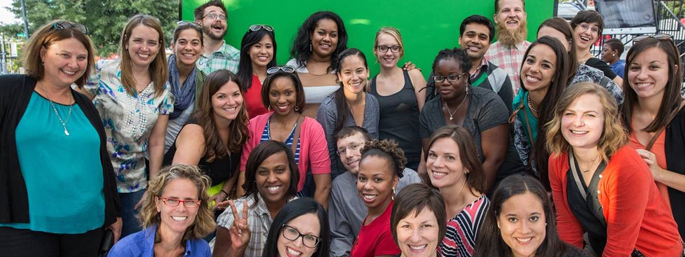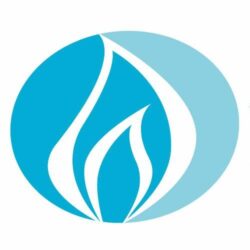Last week, we shared the news that Dan Weisberg and Karolyn Belcher, TNTP’s current EVPs of Performance Management and New Teacher Effectiveness respectively, will replace Ari Rozman and Tim Daly as CEO and president of TNTP by summer 2015. Today, Karolyn talks about her time in the classroom, why life at TNTP is never boring, and what she looks forward to as TNTP’s next president.
You’ve worked in public education for more than two decades. How did you first get involved in the field?
I was part of the very first corps of Teach For America teachers in 1990. My parents really wanted me to be a doctor. The problem was that I didn’t want to be a doctor, although I wasn’t quite ready to break that news to my parents.
I ended up teaching seventh grade life science in New Orleans. I’ve been working in public education ever since.
How has that experience in the classroom shaped the rest of your career?
Working with students for the first time was the most motivating experience in my professional life. I was really taken aback by how different the entire educational experience was for the kids I taught in New Orleans compared to what I’d experienced as a kid. I grew up in rural western Massachusetts, where I just didn’t encounter a lot of kids or families who looked different from me. I went to college near where I grew up. My trip to TFA Institute was the second time I’d ever been on an airplane.
Honestly, I felt pretty ignorant once I got into my classroom in New Orleans and began to truly understand the extent of the challenges my students faced. Some of my seventh graders were still reading at early childhood levels. They were struggling with complex science concepts not because they weren’t bright enough to understand them, but because they just couldn’t read the text, because nobody had successfully taught them how to read. And it sunk in that this was the experience for millions of kids across the country. It was eye-opening, but it also made me deeply committed to changing the situation.
How did you end up coming to TNTP?
I actually helped Michelle Rhee start TNTP in the late 1990s. We were just a tiny startup. I’d been working with Michelle at TFA, and the idea was that we’d help school districts start their own version of the alternative pipeline that TFA had started providing.
But soon after I came to TNTP, I had the chance to become the founding director of John A. Reisenbach Charter School, one of the first charter schools in New York. I jumped at the chance because at that point I’d been working outside the classroom for six or seven years, and I really wanted to get back to working closer to students.
Then, in 2004, the state decided not to renew our charter. It was a tough situation because I didn’t agree with the decision. Neither did a lot of other people, including then-New York City Chancellor Joel Klein. The state made the decision based on the results from one eighth grade class. This was back when New York only gave standardized tests in fourth and eighth grade. The results from the first eighth grade class were disappointing, but we saw a really encouraging jump with our second class and our first fourth grade class did very well. But by the time these results were in, the decision to not renew had already been made. To their credit, our authorizer wanted to signal that they would hold charter schools to really rigorous standards. It is unlikely that a school with our results today would get the same recommendation.
I learned a lot from that experience. I took some time to go to graduate school and then ended up coming back to TNTP—first doing some part-time consulting work, and then eventually full-time as the VP of Human Capital. In my current role, I oversee all of our efforts around teacher preparation, looking for new ways to help the teachers we train become more effective earlier in their careers.
You’ve been at TNTP for almost eight years since you came back. What’s kept you here for so long?
It's never boring. I love my current role because I love always having a hand in teaching and learning, in our client work. It matters to me to stay in touch with what’s happening in classrooms because that’s where I get my energy. And we have so many amazingly talented people working on the instruction side of things at TNTP right now. There’s always someone willing to talk shop about the craft of teaching or curriculum or some other aspect of instruction. I know I’m going to come away feeling reenergized and having learned something new.
It’s also been gratifying to take something like Fast Start, our new approach to teacher training, from a promising idea to a detailed model to something that’s actually helping teachers in the real world. The great thing about TNTP is that taking something from idea to execution is never the endpoint. It opens up a whole other set of questions and challenges that get you excited to dive right back in. Now with Fast Start, for example, we’re working on ways to keep improving it and also apply some of the principles to try to help teachers who are struggling.
As you look ahead to the next year or two at TNTP, what are you most excited about?
I think we have a really exciting opportunity to build on the expertise we’ve developed in human capital over the last two decades, by starting to also help our clients make smart decisions about things like curriculum, instructional materials, and professional development, and to make sure all those things are truly aligned to the work teachers and principals are doing every day. How we bring all those things together is a question I find inspiring and exciting, and I think it’s going to give us a chance to help a lot more students across the country in a really measurable way.
And we’re going to hold ourselves accountable for that—for being able to make a direct link between the work we’re doing for our clients and better academic results for students in those states and districts. I think that will help us make smarter choices. We’re going to do whatever we need to do to make the biggest positive impact on the students we serve.
What’s something that you’ve learned from our current CEO and president, Ari Rozman and Tim Daly, that you want to take with you into your new role?
What I’ve always admired about Tim is his ability to imagine the future of TNTP or the entire education sector four or five years out, and inspire us all to work toward a vision of a world that doesn’t even exist yet. Working with Tim also made me a lot smarter about using and interpreting data, and frankly just about putting together compelling arguments for the policies we care about. He certainly leads by example there, but you also know that you’d better have thought everything through before you have a conversation with him, because he’s going to ask really tough, smart questions.
Ari puts so much of her energy toward tending to TNTP’s culture, which anyone who works here will tell you is what makes this place so special. It’s what helps us recruit and keep so many of the very best people in the field. This is the kind of place where the CEO pays attention to the little details, from hand writing holiday cards to picking personalized one-year anniversary gifts. She’s always made sure that TNTP feels like a family, even though we’re spread out across the country. I know that both Dan and I want to make sure it continues to feel that way.








